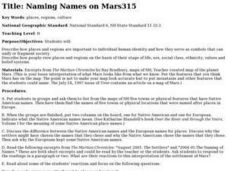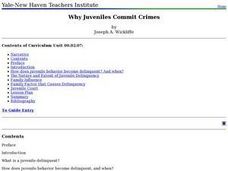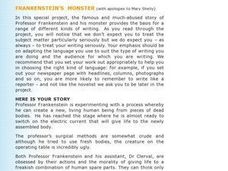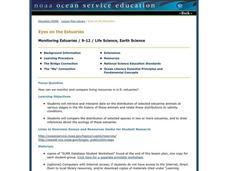Curated OER
The Energy Crisis
Students participate in different activities and discussions to analyze the energy crisis in the United States and other parts of the world. In groups, they research the availability of fossil fuels and the possible alternatives. Using...
Curated OER
Who's at Risk?
Students are asked what do they comprehend about HIV, such as: how does it get transmitted, and what happens to the body once someone contracts the virus. They discuss ways that people can avoid getting and spreading AIDS. Students...
Curated OER
Student Designed Investigations: Observations
Students choose an organism and create an experiment with that organism. In this observation instructional activity, students expose a living thing to something from its environment and record their observations. Students must have some...
Curated OER
So You Think You're Tough
Fourth graders learn how to classify animals. In this invertebrates lesson, 4th graders discuss how we classify thinks into groups and move into a discussion about classifying animals. Students learn about the differences between...
Curated OER
The Enlightenment (1650–1800)
In this online interactive history worksheet, students respond to 9 short answer and essay questions about the Enlightenment. Students may check some of their answers on the interactive worksheet.
Curated OER
Space Day Activities
Celebrate Space Day on May 7th with aerospace lessons that are sure to get kids excited about science and engineering!
Curated OER
Naming Names on Mars
Learners examine maps of New Hampshire to determine town and physical features that have Native American and European names. They discuss the reasons for these names to determine what influences the naming of places. They name geographic...
Curated OER
Heredity, Genetics, Traits
Eighth graders study how an embryo develops into a fetus by undergoing many physical changes which they observe on a poster. They examine the metamorphosis of fruit flies as they develop through a series of changes. They record the...
Curated OER
Why Juveniles Commit Crimes
Young scholars examine the reasons why juveniles commit crimes. As a class, they watch movies showing juveniles committing crims and discuss the impact on societies. They take a field trip to adult and juvenile courts and compare their...
Curated OER
What Happens in the First Nine Months?
Students identify their feelings and learn constructive ways of handling conflict. For this conflict lesson students discuss their feelings and when they are feeling a certain way what they can do to remedy the situation.
Curated OER
Sophocles' Antigone: Ancient Greek Theatre, Live from Antiquity
Students analyze Antigone and its universal issues as well as explore ancient Greece. In this Antigone and Ancient Greece lesson, students read and complete activities for Sophocles' Antigone. Students reconstruct the experience of a...
Curated OER
Stem Cells
In this stem cells activity, students answer multiple choice questions about research found in stem cells. Students complete 5 questions total.
Curated OER
Reading and Writing the Autobiography With a Study of Zora Neale Hurston
Students explore the possible relationships between characters in a novel. They read the novel 'Their Eyes Were Watching God' and answer all the questions on each chapter so that the characters and events are familiar to the students.
Curated OER
Informational Reading: Electronics Are Made from Resources
In this comprehension worksheet, students read about the making of a computer: circuit boards, hard drives, monitors and plastic housings. Students then answer 3 multiples choice questions.
Curated OER
Technology has a Solution!
In this technology worksheet, students summarize four things they learned about technology and the environment. Students then write a report that outlines how technology is solving environmental issues.
Curated OER
Passive in Context
In this tense instructional activity, students read the sentences or phrases and choose which tense they are written in. Students complete 10 problems total.
Curated OER
Interactions of Science and Technologies
Middle schoolers explore how science and technology interact. They discuss important inventions, discoveries and technologies. They research a specific technological advance, or invention, and prepare a presentation that includes the...
Curated OER
Frankenstein's Monster
Students read Mary Shelly's Frankenstein. Using situation and question prompts, students write various essays, letters, and articles concerning the events in the story from different character's point of view.
Curated OER
Eyes on the Estuaries
Students study estuaries and compare several ones in the U.S. In this estuary lesson students interpret data and compare the distribution of different species.
Curated OER
Skimming Exercise
In this skimming exercise learning exercise, students quickly read a passage about reverse culture shock to find main ideas. Students have a short time period to read the text and identify the main ideas.
Curated OER
Religious Revival: The American Response to the Cold War
Students examine the impact of religion on the Cold War. In this Cold War instructional activity, students analyze speeches delivered by Lenin, Truman, and Graham regarding the role of religion in society. As a culminating activity,...
Curated OER
Asylum Talk Show
Students investigate the case of a German ship containing Jewish refugees seeking asylum from Nazi persecution in the late 1930s. They conduct Internet research, watch a video, and role-play passengers from the St. Louis on a simulated...
Curated OER
One Sniff Can Kill!
Students investigate the question: In what ways can a common household products hurt you? This activity integrates with drug and alcohol units in science classes as well as language arts in the form of the Public Service Announcement...
Curated OER
The Civil War: Through the Eyes of Hoosier Women-
Fourth graders explain and analyze changes and interactions of Hoosier women in major social and work roles during the Civil War. They recognize and compare the contributions of both women on the home and war fronts.

























